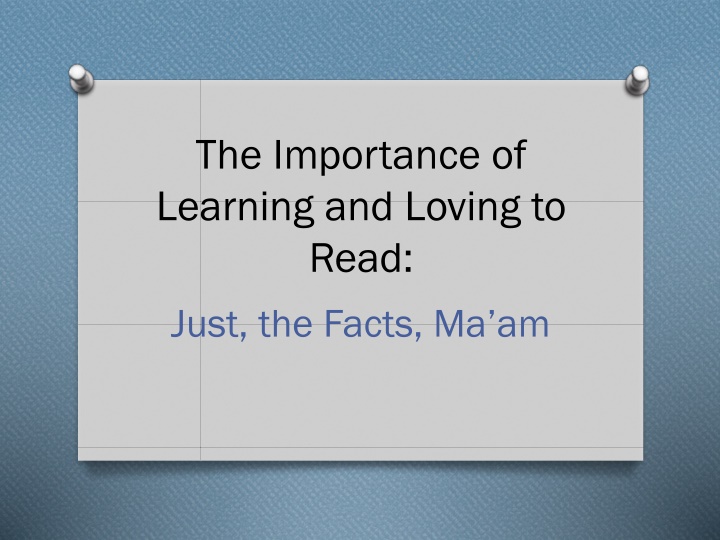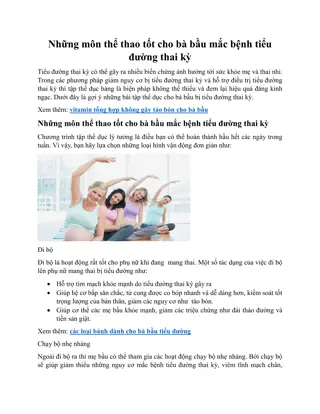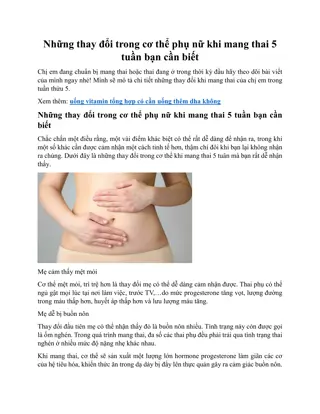The Importance of Learning and Loving to Read
Early childhood literacy plays a crucial role in shaping a child's future success. Statistics reveal the impact of reading on brain development, vocabulary acquisition, school performance, and overall life outcomes. Parents are identified as key influencers in fostering a love for reading among children, emphasizing the significance of daily reading habits. The data presented underscores the importance of prioritizing literacy skills from a young age to unlock lifelong learning opportunities and enhance academic and life success.
Download Presentation

Please find below an Image/Link to download the presentation.
The content on the website is provided AS IS for your information and personal use only. It may not be sold, licensed, or shared on other websites without obtaining consent from the author.If you encounter any issues during the download, it is possible that the publisher has removed the file from their server.
You are allowed to download the files provided on this website for personal or commercial use, subject to the condition that they are used lawfully. All files are the property of their respective owners.
The content on the website is provided AS IS for your information and personal use only. It may not be sold, licensed, or shared on other websites without obtaining consent from the author.
E N D
Presentation Transcript
The Importance of Learning and Loving to Read: Just, the Facts, Ma am
Is everyone reading? O 1 in 4 children grow up without learning how to read. O More than 1 in 3 children arrive at kindergarten without the skills necessary for lifetime learning. O 67% of children in Oregon are NOT proficient readers by 4thgr. O 45% of young children in Oregon are NOT read to every day.
Brain development O From birth to age 3 are critical years in the development of language skills. O During the first 3 years a child s brain develops 700 neural connections per second. O 85% of brain development occurs during the first 5 years.
Vocabulary O Reading 20 minutes per day leads to reading/hearing 1, 800,000 words per year. Reading 5 minutes per day leads to reading/hearing 282,000 words per year, an 84% decrease. O Children in underprivileged homes will hear 30 million fewer words by age 3. O At 18 months a toddler adds one new word every two waking hours to his vocabulary. O The number of words that a child knows on entering kindergarten is a key predictor of his or her future success. O Books introduce 3x more rare words than a young child will hear in conversation.
School success O Children without basic literacy skills when they enter school are 3-4 times more likely to drop out later. O Daily reading to children puts them 1 year ahead of those who are not read to. O The time spent reading a book is the best predictor of a student s reading proficiency. O Reading/listening for 20 minutes a day results in a 6thgrade student in the 90thpercentile. Reading 5 minutes a day results in the 50thpercentile. O Children are 4x more likely to fail to graduate high school on time if they are below proficient readers in 3rdgrade.
Life success O 2/3 of students who cannot read proficiently by the end of 4thgrade will end up in jail or on welfare. O Over 70% of America s inmates cannot read above a 4thgrade level.
Who matters? O Children spend 7800 hours/year outside of school, compared to 900 hours in school. Parents have the biggest chance to grow a learner. O Interest in reading a book outside of school declines from 100% in kindergarten to 54% in 4thgrade. Why? That s when parents stop reading aloud. O 86-98% of a young child s vocabulary is learned from their parents.
What matters? O Reading to a child in an interactive style raises his or her IQ by over 6 points. O Daily reading to children puts them almost 1 year ahead of those who are not being read to.
O Research shows that reading aloud is the single most important thing you can do to help a child prepare for reading and learning.























